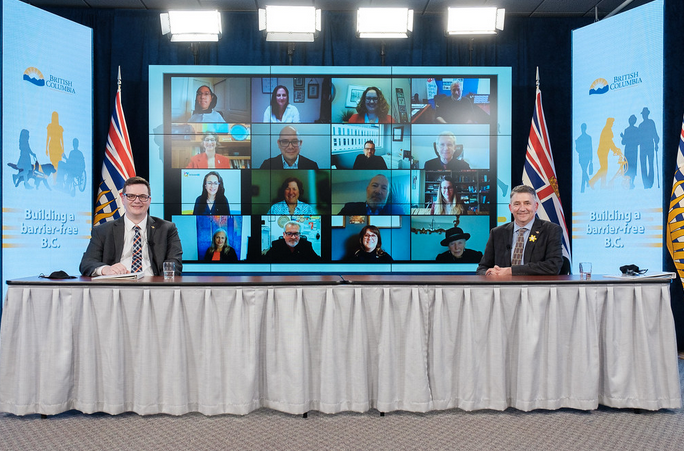

Victoria Wednesday, April 28, 2021 1:47 PM
Neil Belanger, executive director, BC Aboriginal Network on Disability Society –
“The Indigenous peoples of Canada experience a disability rate significantly higher than that of the non-Indigenous population of Canada and face systemic barriers limiting their ability to be active members of their community, both socially and economically. The creation of new accessibility legislation is a positive step to begin to address some of these barriers, and in doing so, create a better future of opportunity and inclusion for all people living with disabilities.”
Helaine Boyd, co-executive director, Disability Alliance BC –
“Disability Alliance BC is looking forward to engaging in the implementation of this legislation, particularly to ensure that the development of regulations and standards will address accessibility with a cross-disability lens, and which will echo across various sectors including housing, education, employment and business.”
Doramy Ehling, CEO, Rick Hansen Foundation –
“A more accessible B.C. will ensure people of all abilities can participate in the places we live, work, learn and play. We look forward to this important legislation and a province, country and world where everyone can go everywhere.”
Chris McBride, executive director, Spinal Cord Injury BC; executive director, BC Paraplegic Foundation; chair, Spinal Cord Injury Canada Executive Directors Council –
“The provincial government’s commitment to improving access, inclusion and full participation for all in communities throughout B.C. is clearly evident through the extensive community engagement it undertook during the development of this new legislation. Spinal Cord Injury BC welcomed the opportunity to work with our government and community organization partners to ensure the experiences, perspectives and wisdom of people with physical disabilities and their families were reflected. With the historic introduction of B.C.’s new accessibility legislation, a critical step has been taken toward making B.C. the best place for people with disabilities and their families to live, work and play.”
Sarah McCrea, executive director, The Prince George Brain Injured Group –
“1.5 million Canadians live with acquired brain injury, which is close to 4% of the population. By 2031, traumatic brain injury is expected to be among the most common neurological conditions affecting Canadians, along with Alzheimer’s disease and other dementias and epilepsy. When we look at promoting accessibility and brain injury, the scope reaches far beyond physical aids, such as ramps or accessible washrooms. There needs to be a societal shift to encourage awareness and acceptance of this disability; that a person who experiences aphasia (difficulty speaking) is not met with impatience or assumptions of intoxication because of slurred or slow speech, but with compassion and understanding that it may take a bit longer. Or that a person who experiences poor memory may forget to don their mask is not a purposeful act of neglect and a reminder or mindfully placed signage would be beneficial. This legislation is a step forward to a world where people with brain injuries can not only live but thrive.”
Jonny Morris, CEO, Canadian Mental Health Association, B.C. Division (CMHA BC) –
“Stigma is one of the biggest barriers for people living with mental health and substance-use related disabilities trying to access services. We also know that stigma is rooted in negative attitudes and behaviours against a particular group and a lack of awareness, which all produce real consequences in the lives and well-being of people affected. CMHA BC is encouraged that the accessible British Columbia act will address attitudinal barriers to disabilities. This will have important impacts for the people we serve. We are hopeful that this legislation will provide the necessary changes to reduce stigma and design inclusive services so that the populations we serve can have equal access.”
Sheila Pither, president, Council of Senior Citizens’ Organizations of B.C. –
“For me, increases in accessibility really translate into gaining freedom. That is precious to those who are trying hard to maintain, or perhaps improve, their independence. As I grow older, it seems that loss of whatever kind is frequent, and gain rather rare. So to have increased accessibility is quite a wonderful feeling, for it is a signal that our society understands the need to maximize the ability of people to thrive.”
Lisa Beecroft and Robin Silvester, co-chairs, The Presidents Group –
“The Presidents Group believes that greater accessibility will provide more opportunities for people with disabilities to access higher education, secure a job, as well as enjoy leisure and cultural activities. Greater accessibility will provide more opportunities for employment, solutions for employers and stimulate economic growth.”
Rob Sleath, president, Access for Sight Impaired Consumers –
“In April 2016, when Barrier-Free BC first called upon the B.C. legislature to create and enact legislation designed to remove barriers for British Columbians with disabilities, it was a vision of independence and inclusion for the hundreds of thousands of people with disabilities. It was a vision of hope, independence and inclusion. Today, that vision begins its journey to becoming a provincewide reality through the first reading of the accessible B.C. act, which will benefit every British Columbian – not just those who currently have a disability, but also those who will acquire a debilitating condition or disability as they age. We applaud the introduction of this act and see a more welcoming, accessible and inclusive British Columbia as venues, services and programs become barrier free and inclusive throughout the province.”
Forrest Smith, president, Greater Vancouver Association of the Deaf and BC Deaf Accessibility Caucus –
“As a linguistic and cultural minority, the deaf community applauds the provincial government’s decision to recognize sign languages and sees this as a significant step toward ensuring equitable access and inclusion for deaf British Columbians.”
Tim Stainton, director, Canadian Institute for Inclusion and Citizenship, University of British Columbia –
“Inclusion requires access, and this new legislation is a major step in fostering a British Columbia that is welcoming for everyone, including those citizens with intellectual and developmental disabilities. We at the Canadian Institute for Inclusion and Citizenship look forward to working with government and community partners to get this right.”
Christopher T. Sutton, CEO, Wavefront Centre for Communication Accessibility –
“We are pleased to see the various standards that have been proposed for development; relating to delivery of services, employment, information and communication, and health, which will make a difference in the lives of all people in British Columbia and will break down barriers. Wavefront Centre is also thrilled that the government joins a small number of other jurisdictions around the world in recognizing sign language as the language of people who are culturally deaf.”
Karla Verschoor, executive director, Inclusion BC –
“Canada ratified the United Nations Convention on the Rights of Persons with Disabilities (UNCRPD) in 2010. Inclusion BC is pleased about this new legislation designed to remove barriers to accessibility and inclusion for people with disabilities. We now have the long-awaited legislative framework to bring the UNCRPD to life in a meaningful way. As we begin to address the deeply rooted inequities in our province, we are encouraged there is a focus on addressing the existing ableism in our systems. Inclusion BC is fully committed to working with our government to expand our collective understanding of accessibility and inclusion for all.”
Tania Vrionis, vice president, community, Multiple Sclerosis Society of Canada –
“B.C.’s new accessibility legislation is an important step in our collective efforts to remove barriers for British Columbians who live with a disability – including episodic or invisible disabilities. To maintain independence, people with episodic disabilities such as multiple sclerosis must be able to participate fully in their communities, have opportunity for employment and have access to public buildings, housing and transportation. We applaud the Government of B.C. for making progress in achieving the goal of accessibility for all B.C. residents.”
Kukpi7 Judy Wilson, secretary-treasurer, Union of BC Indian Chiefs (UBCIC) –
“For many years, UBCIC has advocated for Indigenous persons with disabilities to be heard and to receive greater support and recognition of their human rights and basic needs in British Columbia. Indigenous persons with disabilities often face barriers and disadvantages causing hardship, marginalization in accessing social supports and poverty. Legislative reform to better serve persons with disabilities is long overdue. We are glad to see the Province taking this step with the introduction of accessibility legislation, and we applaud the specific provisions in the proposed law to build in the input of Indigenous peoples in the development of accessibility standards. UBCIC shares the view that meaningful work for persons with disabilities must be grounded in and fully implement the United Nations Declaration on the Rights of Indigenous Peoples and a human rights approach.”
Accessibility Announcement April 28, 2021
This on BC Govt Website go to the link here
